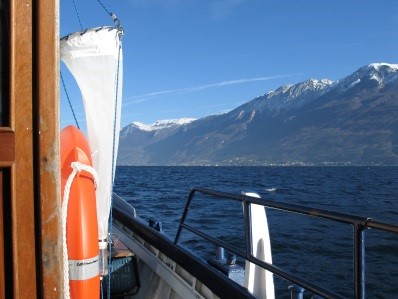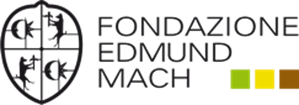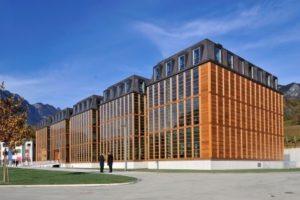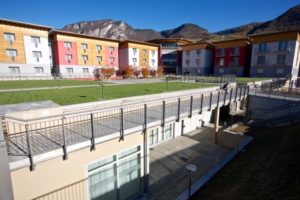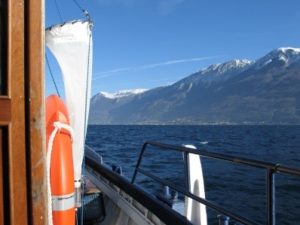Integrating ‘Omics’ Technologies into Aquatic Ecology –
New perspectives in Metagenomic, Metabolomic and Bioinformatic applications in the study of aquatic ecosystems
When: 26– 30 June 2017
Where: Michele all’Adige, Fondazione Edmund Mach (FEM), Italy.
Local responsibles for the course: Nico Salmaso (FEM, Hydrobiology), Claudio Donati (Computational Biology)
The course is aimed to provide both the theoretical foundations and examples of applications of the “Omics” in aquatic ecology, with a focus on the genetic analysis of genomes (metagenomics), proteins and metabolites (proteomics, metabolomics) in biological and environmental aquatic samples. These topics are relevant not only for the advancement of freshwater ecology, but also for the monitoring and management of water resources and the associated biological communities.
At the end of the course, participants will have acquired knowledge, skills and competence on:
– The state of the art of modern ‘Omics’ technologies and their role in the advancement of modern aquatic ecology and establishment of new theoretical foundations.
– The field of application of ‘Omics’ technologies, with practical applied ecology case studies, critically commented, and highlighting pros and cons of different methods and their possible combinations.
– The inclusion of ‘Omics’ in research projects and in different ecological/environmental “problem solving” issues, complementing or challenging traditional approaches; deciding which approach could be the best in function of the final aim of a study.
– The principal bioinformatic pipelines available to analyse High Throughput Sequencing data.
Specific fields of application of the ‘Omics’ approaches in aquatic ecology will include, among the others, the quantitative evaluation and functions of biodiversity in aquatic ecosystems; the impact of climate change, anthropogenic stressors, and pollutants; the introduction and early detection of alien species; and production of cyanotoxins by cyanobacteria. Introductory lectures will be followed by the presentation and critical discussion of case studies, and by the organization of practical laboratory sessions (including bioinformatic pipelines, and guided practice in the laboratories of genomics and metabolomics).
Field trip: The course will be completed by a mid-course field excursion with sampling (Lake Garda or a mountain lake).
Equipment: Participants are requested to bring their laptop with them.
FEM campus and Lake Garda – Photo credits: Massimo Brega e Franco Giacomozzi
Lecturers (provisional list):
Davide Albanese (FEM, Computational Biology), Leonardo Cerasino (FEM, Hydrobiology), Claudio Donati (FEM, Computational Biology), Graziano Guella (University of Trento, C3A, Centro Agricoltura, Alimenti, Ambiente); Massimo Pindo (FEM, Genomics Platform), Nico Salmaso (FEM, Hydrobiology); Nicola Segata (University of Trento, CIBIO – Centre for Integrative Biology); Dino Zardi (University of Trento, Dipartimento di Ingegneria Civile e Ambientale); other speakers will be announced from NINA-Lillehammer (Norway) and other European Institutions.
Tentative time schedule:
Monday 26 June
AM Arrival
PM 14:00-18:30:
• IRSAE Introduction, and FEM logistic
• General introduction and aims of the course
• Introduction to operating systems and HTC used in bioinformatic, and R
• Preparation laptop and installation bioinformatic tools
Tuesday 27 June
AM 8:30-12:30:
• Aquatic metagenomic, general objectives and tools
• Marker gene amplification metagenomics
• Full shotgun metagenomics
PM 14:00-18:30:
• Principal bioinformatic metagenomic pipelines (theory)
• Bioinformatic Laboratory practice (MICCA and others)
• Downstream analyses (R, Phyloseq)
• Case studies and fields of application, and integration with classical approaches.
Wednesday 28 June
AM 8:30-12:30:
• Library preparations – Case studies and field of applications
PM 14:00-18:30:
• Mid-Course Excursion – Sampling – e.g. Garda Lake
–Social dinner
Thursday 29 June
AM 8:30-12:30:
• Ecological metabolomic, theory
• Case studies and field of applications, and integration with classical approaches.
PM 14:00-18:30:
• Visit to the chemical (LC-MS) and genetic lab, and genomic lab, with practice (by technicians)
Friday 30 June
AM 8:30-12:30:
• Experiment design, applications. Case studies.
Examination
PM Departure. Summer course will end after lunch.
Number of places (from and outside IRSAE): 18 IRSAE + 7-10 outside IRSAE
Price (including participation, accommodation, breakfast, lunch and coffee breaks (Monday-Friday):
– IRSAE-members: No course fee. Accommodation on campus could be arranged: Single occupancy 375 €, or Double occupancy, 310 € (mobility grant can be applied for). More information about registration here.
– IRSAE Research staff: No course fee. Accommodation on campus could be arranged: Single occupancy 375 €, or Double occupancy, 310 € (mobility grant can be applied for). More information about registration here.
– Non-IRSAE-members: Course registration is 200 euros, including coffee breaks. Accommodation on campus could be arranged: Single occupancy 375 €, or Double occupancy, 310 €. More information about registration here.
How to apply: Deadline: 4th June. Follow this site to register for the course, and send an e-mail to FEM if you have any questions.
Mobility grant: IRSAE members can apply for a mobility grant to partially cover food, accommodation and travel costs.



